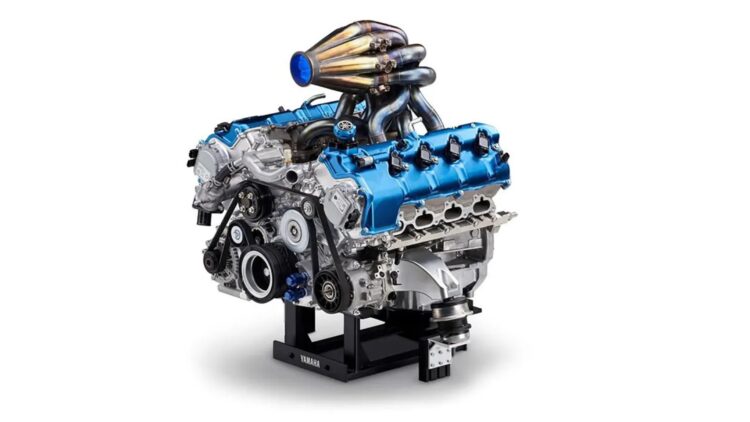In Japan, Toyota Motor Corporation and other automotive companies are teaming up to explore new fuel options for internal combustion engines. Toyota’s latest collaboration is with Yamaha Motors, commissioned to work on a 5.0-litre V8 engine that runs entirely on hydrogen. President Yoshihiro Hidaka announced that they are working towards carbon neutrality by 2050.
Yamaha’s hydrogen-powered V8 engine
Back in November, five companies—Kawasaki Heavy Industries, Subaru Corporation, Toyota Motor Corporation, Mazda Motor Corporation, and Yamaha Motor—announced that they would collaborate on exploring new fuel options for internal combustion engines to achieve carbon neutrality. At the announcement event, Yamaha unveiled a hydrogen-powered V8 engine it developed for Toyota. This engine is based on the 5.0-liter V8 from the Lexus RC F luxury sports coupe but has modified injectors, cylinder heads, intake manifolds, and more. It can crank out 450 horsepower at 6,800 rpm and up to 540 Nm of torque at 3,600 rpm.
The company’s focus on hydrogen engines comes from the company’s passion for internal combustion engines. Instead of abandoning traditional ways and focusing on electric engines, the company hopes to continue working with different innovative companies and be responsible for chartering a new future in the automotive industry.
The potential of hydrogen engines
Yamaha started working on a hydrogen engine for cars about five years ago. Takeshi Yamada from the Technical Research & Development Center’s Automotive Development Section is part of the team developing this engine, and as the project progressed, he began to see its potential.
While working with hydrogen for fuel, Yamada noticed that hydrogen engines are easy to use and don’t need many electronic driving aids. He recalls when different people came in to test the prototype. They were spectacular, but in the end, they were quite pleased with the results. The more Yamada worked with hydrogen engines, the more he saw their potential as more than just a stand-in for Gaslone.
Yamada and the team focus on something called “Kanno Seino,” which means sensory or exhilarating performance. For example, their engine has an 8-into-1 exhaust manifold that gives off a harmonic, high-frequency sound. “This is the kind of engineering challenge we love, and I personally want to explore not just performance but also a whole new appeal for internal combustion engines that the world hasn’t seen before,” Yamada says.
Like many companies, Yamada and his fellow engineers believe in the potential of a fully hydrogen-powered engine. By working with a growing network of partners, Yamada feels they’re on the verge of unlocking that potential. The potential of hydrogen engines seems unlimited.

